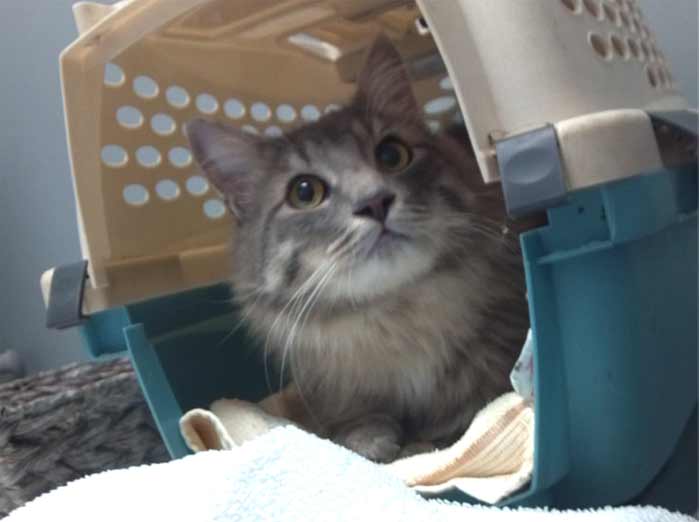Pets and herbs
Pets should be active and have bright eyes. Just like humans, pets need a nutritious diet, plenty of fresh water, regular exercise, comfortable shelter, clean air, companionship, and regular health care.

Healthy dogs, cats, and other warm-blooded pets are playful and attentive. Since they can't tell us that something is wrong, pet owners must watch for anything out of the ordinary.
Since they can't talk, treat pets like small children. Watch for signs of health problems such as dull eyes and lack of energy.
Treating minor pet health problems with herbal remedies
Minor cuts and shallow wounds benefit from applications of calendula, goldenseal, yellowroot, myrrh, or comfrey salve. Deep wounds need professional treatment.
Dehydration calls for immediate attention. Try giving a bowl of weak chamomile or comfrey tea. If the pet refuses to drink, wet your pet's lips with an eye dropper containing water at room temperature, being careful not to overdo it. You do not want water to get in their lungs!
Wetting the lips may encourage the pet to drink. Do not ever force feed your pet!

Pets should be treated like small children and babies.
Symptoms to watch for include everything from lack of energy, cloudy eyes, and dull coat, to persistent scratching, diarrhea, poor appetite, whining, wheezing, and coughing.
If symptoms continues over a day or two, or become severe, seek medical help. Final diagnosis usually requires a trip to the local veterinarian for examination and tests.
Use small doses of herbs on pets.
Everyday problems can be treated with herbs. Pets should be given small doses, just like with babies and small children.
Pets with diarrhea, skin problems, and eye problems
Diarrhea calls for a 24 hour liquid diet. Give water and broth with a little activated charcoal sprinkled on top.
Skin problems may benefit from a zinc supplement, vitamin E oil application, or a daily dose of cod liver oil.
Eye infections can benefit from applying cod liver oil and eyebright tea to the eyelids. Also for the eyes, many pet centers and farm stores sell antibacterial ointment without a prescription. If infection persists, see a vet!

Treating ear mites, fleas, ticks, and parasites
Ear mites in dogs may be removed with a cotton ball dipped in 1/4 cup of witch hazel and one drop of tea tree essential oil. Always use caution when using essential oils around pets. See warnings (in red) below.
Another ear mite remedy calls for half a cup of olive oil and one ounce of ground rosemary.
- Mix and let sit in a covered jar for three days.
- Keep mixture in a warm, dry place such as a pantry.
- Shake daily.
- Strain and add 400 IU of Vitamin E.
- Put half a dropper full in both of your pet's ears and massage gently for a few minutes.
- Then let the dog shake its head.
- Repeat every week to kill any mites that have hatched.
Fleas, ticks, and mites hate garlic. Sprinkle on your pet's back and rub into fur. If this doesn't work, try diatomaceous earth, which kills fleas.
Do not breath in diatomaceous earth dust or get it near your pet's face since it can damage lung tissue when inhaled.
Fresh or dried pennyroyal may be sprinkled in your pet's bed to deter fleas. (Pennyroyal essential oil is too strong to be used around pets and is not recommended).
Cedar chips are also known to repel fleas.
Treating pets for bad breath, gas, mange, and worms with herbal remedies
Occasional bad breath may be treated with parsley. Snip fresh parsley into pet's food. Constant bad breath may be signs of tooth decay and will require a trip to the veterinarian.
Gas calls for alfalfa, ginger powder, or fennel seeds.
Worms may be treated with black walnut hull tea or pumpkin seeds.
For mange on a dog, use a few drops of tea tree oil in the pet's bath. Small patches of stubborn mange may be treated with diluted applications of tea tree oil, but do not use extensively on large areas.
Some types of mange result from a blood infection and must be treated by a healthcare professional. Do not put essential oils on cats.
Buy quality pet food.
Many pet foods lack the necessary ingredients to sustain life. If the same amount that goes in comes out, then the pet just as well be eating saw-dust pellets. If at all possible buy something besides the cheapest brand.
Buy the best pet food that you can afford then stick to it (especially with puppies and kittens). A pet needs good nutrition to stay healthy.
Pets, just like humans, need fresh food in their diet. Fresh meat and vegetables contain essential enzymes not found in processed pet food. A healthy diet includes quality dry pet food and some meats, grains, and veggies every day.
Cats need more raw meat than dogs. Supplements like wheat germ oil, brewer's yeast, and bran may be sprinkled on food.
Catnip and wheat grass for pets
Plant some catnip for you cats. They will love it. They also like micro-greens! Try growing wheat grass for yourself and your pets.
Our cows and livestock are our pets.
Here on Payne Mountain Farms, we treat our livestock like pets, giving them the best food possible. We even grind our own feed most of the time.
Essential oils and pets
Be very careful when using essential oils and aromatherapy around pets. In case the scent is toxic to their sensitive noses, they should always have a way to escape. Access to a screened in porch or another room with fresh air is a must when using essential oils around animals.
Not many studies have been done on the effects of medicinal herbs and essential oils on pets. Until more research is done, it is best to avoid treating pets with essential oils. Essential oils have been associated with negative reactions in dogs and cats. More research is needed.
*Be very careful with cats! Phenols in essential oils can harm them in a matter of minutes. Always consult with your veterinarian before using any herbal remedy especially if your pet is pregnant, nursing, or taking other medications.
Sources:
https://www.ncbi.nlm.nih.gov/pmc/articles/PMC7712454/
Blessings to you and yours!
Thanks so much for reading my blog. Jan.

*Note - the information on this website has not been evaluated by the Food and Drug Administration.
© 2005-2024 website design and content by Janice Boling